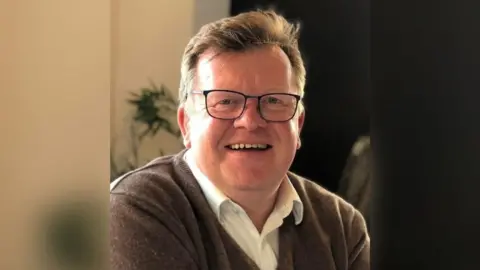'We have to fund the Deaflympics ourselves'
 Supplied
SuppliedThe Deaflympics is a "culturally important event" in the calendar but athletes have to fund themselves, says the CEO of UK Deaf Sport.
Chris Ratcliffe, 57, was born profoundly deaf and has represented Great Britain at the Deaflympics as a swimmer, as well as winning the Deaf Rugby World Cup in 2002 with Wales.
The Deaflympics, inspired by the Olympics, was set up partly to celebrate deaf culture, but also "to be able to compete with one another on a level playing field," Mr Ratcliffe said.
He is hoping to raise awareness of the Deaflympics as it celebrates its 100th anniversary.
What is the Deaflympics?
The first Deaflympics was held in Paris back in 1924, with nine countries including Great Britain taking part.
It takes place every four years, with the 51st games to be held in Tokyo next year.
UK Deaf Sport is hoping to send a team of 115 people in sports such as athletics, swimming, and football.
Deaf athletes do not have any exclusive categories at the Paralympics, which were first held in 1960.
In the UK, elite deaf athletes face a £4,000 self-funded barrier to compete next year, Mr Ratcliffe added.
He said they rely on sponsorship and stressed that the Deaflympics is an "elite-level competition".
"That's a big challenge," he added. "Because not only are they in full-time education or holding down full-time jobs, they will be training significantly."
The Department for Culture, Media and Sport said Sport England was currently providing £1.27m in funding for UK Deaf Sport through to 2027.
However, the government does not directly fund athletes competing at the Deaflympics via UK Sport as their remit is Olympic and Paralympic athletes only.
'Lots of barriers'
Mr Ratcliffe, who lives in Bottesford, Leicestershire, said "a lot of deaf people" can be cut off from mainstream society as they struggle to communicate.
"That's a real challenge, particularly when sport revolves around communication and engagement with people," he said.
"I think the biggest fear a lot of the children have about playing sports or physical activity is going into an environment where they don't feel comfortable and they don't understand what's going on.
"There's lots of barriers in the way in terms of communication."
Mr Ratcliffe said his aims as CEO are to raise awareness of deaf sport in the UK and to provide more opportunities for deaf people to take part in sport.
He said: "Deaf children are twice as likely to be inactive in comparison to hearing children of their own age, so there's a huge amount of work to be done."
Inspiring future generations
UK Deaf Sport recently launched Destination Deaflympics, a campaign which seeks to promote and raise awareness of the event because many children are not aware of it.
Mr Ratcliffe said the event has not had "a huge amount of coverage" in previous years.
However, next year Mr Ratcliffe said they will target younger audiences through social media with short clips and highlights from the games and there are currently discussions about a potential studio for the duration of the event.
Mr Ratcliffe said he also wants more Deaflympic athletes to engage with deaf children in schools and inspire the next generation.
Follow BBC Leicester on Facebook, on X, or on Instagram. Send your story ideas to [email protected] or via WhatsApp on 0808 100 2210.
